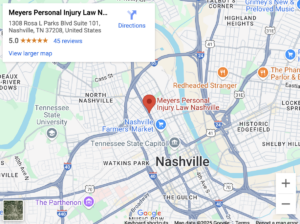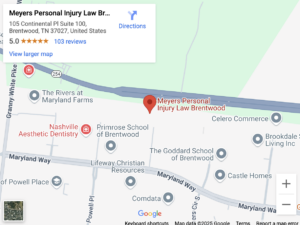Meyers Personal Injury Law | July 31, 2024 | Tennessee Law

In an effort to enhance road safety and reduce distractions, Tennessee implemented a Hands-Free Law governing the use of mobile devices while driving. Understanding the specifics of this law is crucial for every driver in the state. In this blog, we’ll delve into what the Tennessee Hands-Free Law entails, its implications for drivers, and tips on how to comply for safer roads.
A Complete Overview of the Tennessee Hands-Free Law
A Complete Overview of the Tennessee Hands-Free Law
The Tennessee Hands-Free Law restricts drivers from holding or using a cellphone while driving. This legislation, known as Public Chapter No. 412, aims to reduce distracted driving incidents by making it illegal to use a wireless telecommunications device in hand while operating a vehicle. Specifically, drivers cannot hold a phone with any part of their body, send or read text messages, or watch videos on their devices.
Implemented in 2019, the law enhances road safety by requiring drivers to rely on hands-free options such as Bluetooth or voice commands. Awareness campaigns like Hands Free Tennessee have been launched to educate the public about the law’s stipulations and the importance of minimizing distractions on the road.
Penalties for violating this law include fines that can increase with repeated offenses, aiming to deter drivers from risky behaviors. The initiatives by the Tennessee Department of Safety and Homeland Security and other agencies underscore the seriousness of distracted driving and the necessity for all motorists to comply with these regulations.
Understanding the Tennessee Hands-Free Law
Roads with fewer car accidents makes Tennessee a better place for all of us. The Tennessee Hands-Free Law aims to reduce distracted driving by prohibiting the use of handheld electronic devices while operating a vehicle. This law was enacted to enhance road safety and hold motorists accountable for distracted driving behaviors.
Key Provisions of the Law
The Tennessee Hands-Free Law, officially known as Public Chapter No. 412, came into effect on July 1, 2019. The core requirement is that drivers must use hands-free devices if they wish to use their phones while driving. This means no holding or physically supporting a phone with any part of the body.
Some prohibited actions under this law include:
- Holding a cellphone to talk or text
- Watching videos or recording conversations
- Reaching for a device in a way that requires the driver to no longer be seated or restrained by a seatbelt
There are several exceptions permitted, such as:
- Using a device in an emergency to contact emergency services
- Hands-free use such as Bluetooth and speakerphone functionalities
- GPS devices integrated into the vehicle
Enforcement and Compliance
Enforcement of the Tennessee Hands-Free Law is carried out by local and state law enforcement agencies. Officers are trained to spot violations such as vehicles drifting due to phone use. Fines and penalties for non-compliance are structured to deter violations.
Penalties include:
- First offense: $50 fine
- Third or subsequent offense: Up to $100 fine
- Violation in a construction zone, school zone, or resulting in an accident can increase fines up to $200
Compliance is crucial. Motorists are encouraged to adapt by using hands-free technologies. Public awareness campaigns, like Hands Free Tennessee, help educate drivers about the law and safe driving practices. The state has also posted clear signage on highways to inform drivers about the law.
Consequences and Penalties
The Tennessee Hands-Free Law imposes strict penalties for violations, classifying them as Class C misdemeanors. Fines vary based on the nature and recurrence of the offense.
Understanding Penalties
Violating the Tennessee Hands-Free Law results in a Class C misdemeanor. For a first-time offense, offenders face a fine of $50. Repeat offenders, or those causing accidents, incur fines of $100. If the violation occurs in a work zone or school zone with workers or children present, the fine increases to $200.
Officers have discretion to issue warnings or citations. Additionally, each violation results in a moving traffic offense, impacting the driver’s record. This can lead to increased insurance premiums and potential demerit points on their driving record. Enforcing these penalties aims to reduce distracted driving incidents.
Impact of the Law on Road Safety
The Tennessee Hands-Free Law has led to significant changes in driver behavior and notable improvements in road safety statistics.
Behavioral Changes in Drivers
Since the implementation of the Tennessee Hands-Free Law in 2019, drivers have modified their habits significantly. Many have adopted hands-free technology to comply with the regulations. Bluetooth headsets, car audio systems, and other hands-free devices have become common tools among motorists. Such adaptations have reduced instances of handheld device use while driving.
Law enforcement officers now actively monitor compliance, which has raised awareness among drivers about the dangers of distracted driving. The possibility of fines and penalties also serves as a deterrent against breaking the law. Public information campaigns have supplemented legal enforcement, educating drivers about safe driving practices and the importance of keeping both hands on the wheel.
Statistical Road Safety Improvements
The impact on road safety statistics has been considerable since the law’s enforcement. Initial data indicates a decrease in traffic accidents related to distracted driving. Police reports and traffic studies show fewer reported instances of collisions caused by drivers using electronic devices.
Moreover, the law’s stringent penalties, which range from a $50 fine for first-time offenders to $200 for violations in work or school zones, have contributed to a more cautious driving environment. There are also long-term benefits, including potentially lower insurance premiums for drivers with clean records. As compliance improves, continued monitoring will further clarify the law’s effectiveness in enhancing overall road safety across Tennessee.
Contact the Tennessee Car Accident Lawyers at Meyers Personal Injury Law
If you’ve been involved in an accident where another driver violated the Tennessee Hands-Free Law, Meyers Personal Injury Law is here to represent you. Our experienced legal team understands the complexities of distracted driving cases and is committed to securing the compensation you deserve. The Tennessee Hands-Free Law prohibits drivers from holding or physically supporting a phone while driving, and violations can lead to serious accidents.
At Meyers Personal Injury Law, we will thoroughly investigate your case, gather crucial evidence, and advocate for your rights. Trust us to handle the legal complexities while you focus on recovery. Contact Meyers Personal Injury Law today for a consultation.
Contact Our Nashville Personal Injury Law Firm Today at Meyers Personal Injury Law
If you were injured in an accident in Nashville or Brentwood and need legal help, contact our Nashville personal injury lawyers at Meyers Personal Injury Law to schedule a free case review today.
Meyers Personal Injury Law Nashville
1308 Rosa L Parks Blvd Suite 101,
Nashville, TN 37208
(615) 258-9000
Meyers Personal Injury Law Brentwood
105 Continental Pl Suite 100,
Brentwood, TN 37027
(615) 258-9000



